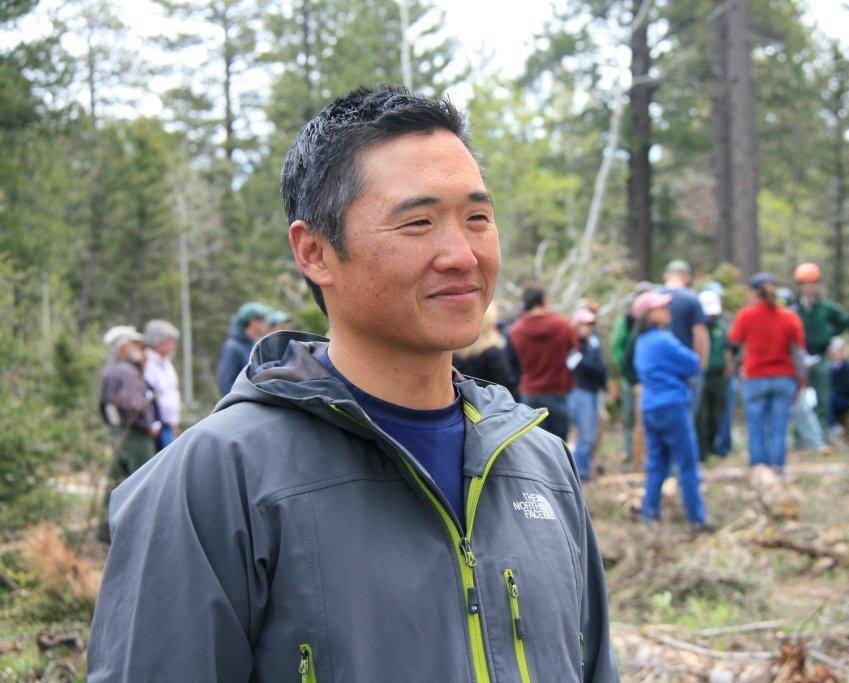
“It was a natural fit for me to bring the perspective of science for forest health and wildfire management to this roundtable,” said Cheng, director of the Colorado Forest Restoration Institute at CSU.
The framework of Western climate resilience priorities announced on Feb. 5 by U.S. Senator Michael Bennet (D-Colorado) was carefully crafted by state leaders with a connection to the Colorado River – from the agriculture, water, local government, tribal government, education, environment and business communities – including an expert from Colorado State University.
The senator initially convened this group, known as the Bennet Western Climate Resilience Roundtable, in November 2020 to develop a collaborative, consensus-driven set of priorities for Western climate resilience. Last week, members of the roundtable presented their final framework to Bennet, who plans to use it to drive his policy work in the Senate and as he works with the Biden Administration on its national climate strategy.
Tony Cheng, professor in the Department of Forest and Rangeland Stewardship, is one of 19 roundtable members. He also serves as the director of the Colorado Forest Restoration Institute at CSU.
Three priorities
The Bennet Western Climate Resilience Roundtable framework emphasizes three primary priorities for Western climate resilience:
- Our resilience is dependent on strong local economies in the West. Our climate resilience strategy must include tools for local economies in the West to adapt to changing climate and economic conditions and build long-term prosperity in a future powered by a clean economy.
- Supporting healthy soils, forests, rangeland, rivers and watersheds will make our communities more resilient and help maximize the climate mitigation potential of western landscapes.
- Our climate resilience is dependent on a thorough and science-based understanding of actions needed to sustainably adapt to and mitigate climate change.
Importance of investing in science, education
Cheng said that he’s had a longstanding relationship with the congressional delegation from Colorado – including the senator and his staff – and that he previously took part in several similar roundtables over the years, focusing on forest health and restoration.
“It was a natural fit for me to bring the perspective of science for forest health and wildfire management to this roundtable,” he said.
The group’s priorities also align with the Colorado Forest Restoration Institute at CSU.
“The Department of Forest and Rangeland Stewardship is increasing its emphasis on climate change, and we are moving this topic to the center of everything we do,” said Cheng. “It’s been exciting to link what we’re doing at CSU with national policy. It also shows some visionary thinking on the part of Sen. Bennet about how we tackle climate change when it comes to forest health and the increasing risk of large, severe fires as the climate is changing.”
Cheng said it was interesting and important to hear from a variety of people who work in agriculture, farming, on Native lands, urban and community development and water and river districts.
“The roundtable members represent diverse communities, and they all talked about the importance of science and education as one of the pillars of this framework,” he said. “We need a greater investment in science and education to be able to meet these challenges.”
In a news release, Bennet heralded the “terrific work” by the roundtable members to reimagine climate policy. He said the ideas put forward are already informing his team’s work.
“I plan to share their framework with my colleagues in the Senate and the Biden Administration to help them understand why climate resilience is so important to Colorado and the rest of the Mountain West,” said Bennet. “I will do my part to ensure these priorities are part of every discussion going forward about climate and the country’s economy. I think this framework will be an important tool to demonstrate to the country that climate change isn’t a future condition in the West – it’s here now. And the survival of our economy and our way of life depends on tackling this challenge.”
Members of the Bennet Western Climate Resilience Roundtable
Chair: Andy Mueller, general manager, Colorado River District
Steve Anderson, farmer, Olathe, manager of Uncompahgre Valley Water Users Association
Steve Beckley, owner of Glenwood Canyon Adventure Park and Iron Mountain Hot Springs
Leland Begay, associate general counsel, Ute Mountain Ute Tribe
Paul Bruchez, rancher, Grand County
Sonja Chavez, general manager, Upper Gunnison River Water Conservancy District
Tony Cheng, director, Colorado Forest Restoration Institute, CSU
Tracy Gallegos, director, Colorado Migrant Education Program
Russ George, director, Colorado Inter-Basin Compact Committee
Jon Goldin Dubois, President, Western Resource Advocates
Bryan Hannegan, President and Chief Executive Officer, Holy Cross Energy
Jonathan Houck, Gunnison County commissioner
Merrit Linke, Grand County commissioner
Jim Lochhead, CEO, Denver Water
Becky Mitchell, director, Colorado Water Conservation Board
Kelly Nordini, executive director, Conservation ColoradoKathy Rall, water resources division head, Southern Ute Indian Tribe
Sarah Shrader, owner and co-founder, Bonsai Design
Bruce Talbott, orchard/vineyard manager, Talbott’s Mountain Gold
Read more from the other members of the roundtable and learn about actions Sen. Bennet is already taking based on the Western Climate Resilience Roundtable’s work at https://col.st/qA99k
This article was adapted from a news release produced by Sen. Michael Bennet’s office